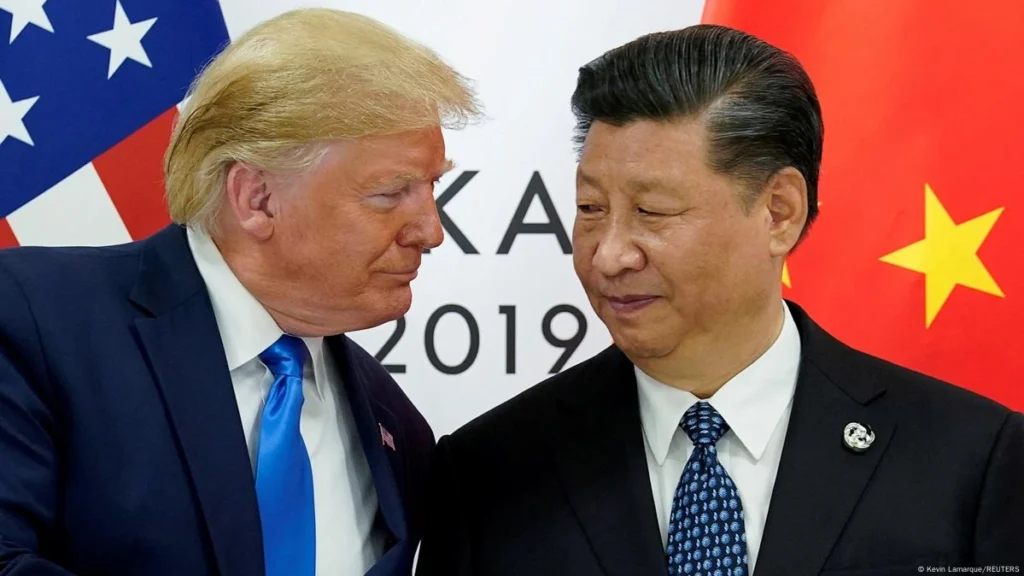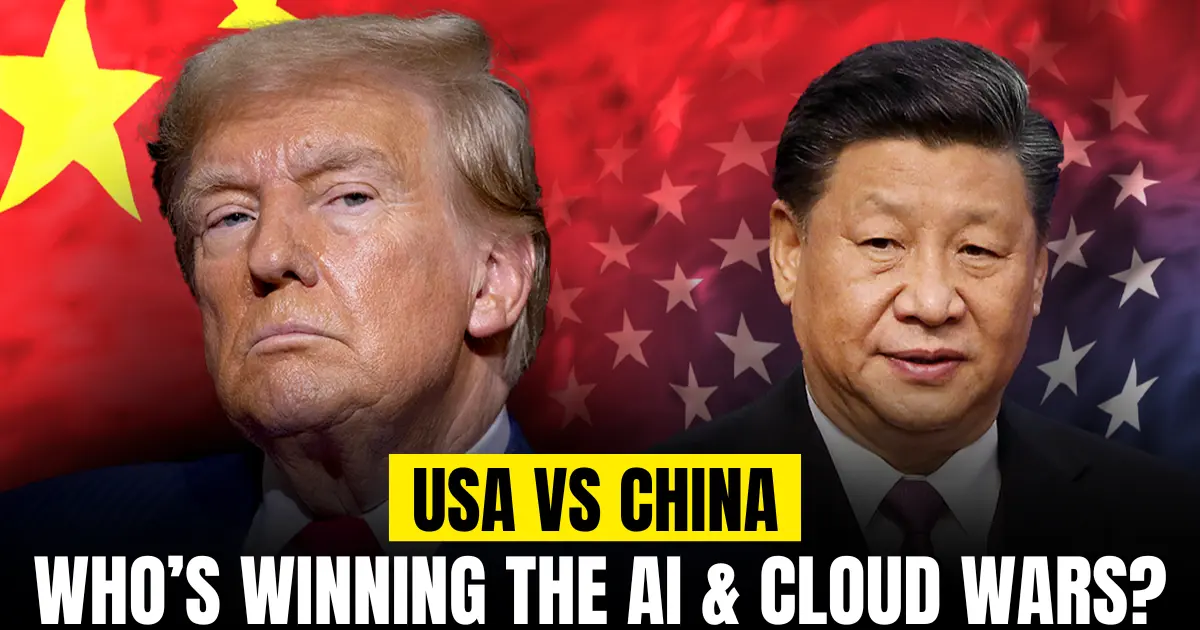U.S. Big Tech still dominates in market size, but Chinese tech giants like Alibaba & Tencent are roaring back with higher 2025 returns. We break down Alphabet vs Baidu, Amazon vs Alibaba, and Meta vs Tencent — with performance data, insights, and the outlook ahead.
Table of Contents
Introduction
The Big Tech rivalry between the U.S. and China isn’t just about gadgets and social apps anymore — it’s about AI dominance, cloud wars, market scale, and stock performance.
In 2025, Chinese tech stocks have staged a remarkable comeback, with Alibaba and Tencent leading the pack with 40%+ returns, while U.S. giants like Alphabet and Amazon have underperformed. But here’s the twist: market cap still decides the game — and the U.S. titans are sitting comfortably in the multi-trillion-dollar club, while China’s biggest names are fighting from behind.
This is not a simple “China is winning” or “U.S. dominates” story. The reality is far more complex — shaped by tariffs, antitrust rulings, AI innovation, consumer confidence, and government crackdowns.
Let’s dive into the face-offs shaping Big Tech’s future.
2025 Stock Performance Snapshot

Here’s a quick look at how the top six U.S. and Chinese tech stocks have performed so far this year:
| Company | Country | 2025 YTD Return | Market Cap (Approx.) | Key Strength |
|---|---|---|---|---|
| Alphabet (GOOGL) | U.S. | +8% | $1.9T | Global ad dominance |
| Amazon (AMZN) | U.S. | +7% | $1.7T | AWS leads cloud profits |
| Meta (META) | U.S. | +34% | $1.2T | Monetizing messaging & ads |
| Baidu (BIDU) | China | +12% | $65B | AI-powered search & cloud pivot |
| Alibaba (BABA) | China | +42% | $210B | AI-driven cloud & e-commerce |
| Tencent (TCEHY) | China | +46% | $380B | Super-app ecosystem + gaming |
Key Takeaways:
- Chinese stocks outperformed U.S. peers in 2025 returns.
- U.S. giants still control market scale with multi-trillion valuations.
- Meta has been the surprise U.S. leader, while Tencent dominates China.
Alphabet vs. Baidu — The AI-Driven Search Wars
Alphabet (Google) still runs the global advertising machine, collecting billions in data and pricing power. But 2025 hasn’t been smooth sailing. Its antitrust court loss threatens Google Search’s dominance and could shake the foundation of its Chrome browser ecosystem.
Meanwhile, Baidu — China’s homegrown search king — is quietly pivoting hard into AI and cloud services. The Chinese government’s more supportive tone in recent months has boosted investor sentiment, but Beijing’s unpredictability remains a wild card.
Columnist Take:
“Alphabet’s innovation pipeline is unmatched, but regulatory risk is real. Baidu is smaller, but its AI-first strategy in China’s walled ecosystem gives it an edge domestically.”
Amazon vs. Alibaba — Cloud Profits vs. Consumer Volatility
Amazon’s story in 2025 remains centered on AWS (Amazon Web Services) — the profit engine funding its broader empire. However, U.S. antitrust rumblings haven’t disappeared, and e-commerce growth has slowed compared to pre-pandemic levels.
Alibaba, meanwhile, is leaning heavily into AI to reignite cloud revenue. But the Chinese consumer slowdown casts a long shadow — when sentiment weakens, Alibaba’s sales stumble, forcing the company to depend on government stimulus.
Columnist Take:
“Amazon’s consistent cash flow and AWS dominance keep it a Wall Street darling, but Alibaba’s 40%+ rally proves AI bets are paying off. Still, the consumer slowdown could flip the narrative quickly.”
Meta vs. Tencent — Messaging Monetization vs. the Super App Moat
Meta’s Facebook + Instagram dominance continues, but the real story in 2025 is messaging monetization. By integrating ads and payment gateways into Messenger and WhatsApp, Meta is unlocking a massive new revenue lever.
Tencent, on the other hand, isn’t just a social platform — it’s a super app empire. WeChat integrates messaging, payments, gaming, shopping, and content, making Tencent the one-stop ecosystem for Chinese users. With its gaming division rebounding, Tencent looks increasingly untouchable domestically.
Columnist Take:
“Meta is playing catch-up on payments and social commerce, while Tencent’s WeChat remains the gold standard for super-app stickiness.”
The Big Shockers of 2025 — Tariffs, AI, and Antitrust
The U.S.-China tech rivalry isn’t just about innovation — politics and policy are driving market moves:
- Tariff Wars: U.S.-China back-and-forth created massive uncertainty early this year. The current 90-day tariff truce may expire soon.
- DeepSeek’s AI Disruption: A Chinese startup proved AI can be built without expensive top-tier chips, shaking up investment strategies globally.
- Alphabet’s Antitrust Loss: A ruling that could reshape ad auctions, browser control, and mobile search discovery worldwide.
These aren’t just side stories — they’re market-moving catalysts investors need to watch.
What to Watch in 2025
| Matchup | Key Risk | Growth Opportunity | Our Outlook |
|---|---|---|---|
| Alphabet vs Baidu | U.S. antitrust vs China regulation | AI-powered search | Neutral — Alphabet leads globally, Baidu thrives locally |
| Amazon vs Alibaba | Consumer slowdown vs AI pivot | Cloud revenue acceleration | Slight Edge: Amazon |
| Meta vs Tencent | Monetizing messaging vs gaming rebound | Social commerce + payments | Tencent’s super-app moat keeps it ahead in China |

Bottom Line — China Wins Returns, U.S. Keeps the Throne
In 2025, Chinese tech stocks are winning the performance battle, but U.S. Big Tech still dominates the strategic war.
- China = Higher Returns (short-term upside)
- U.S. = Bigger Scale (long-term stability)
Investors should expect a volatile second half of 2025 as AI innovation, trade policy, and antitrust rulings shape the next phase of the U.S.-China tech rivalry.
FAQs
Q1. Why are Chinese tech stocks outperforming U.S. tech in 2025?
Because Chinese stocks like Alibaba and Tencent rebounded from 2024 lows, boosted by AI-driven growth and government support.
Q2. Which U.S. Big Tech company has the best 2025 performance so far?
Meta leads the U.S. pack with +34% YTD returns, thanks to messaging monetization.
Q3. Should investors favor U.S. or Chinese tech stocks?
U.S. stocks offer long-term safety due to their size, while Chinese names present higher short-term upside but carry policy risks.
